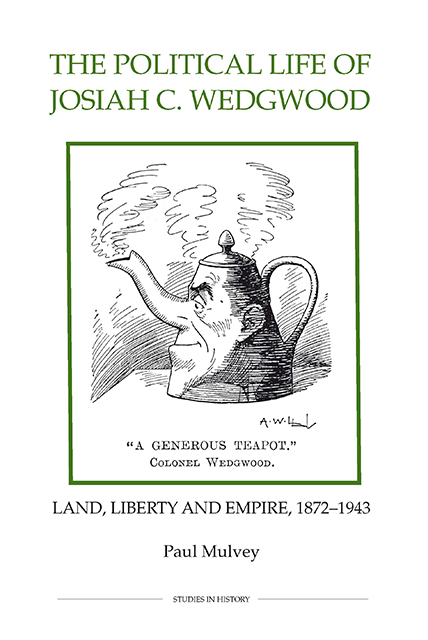9 - The Indo-British commonwealth
Published online by Cambridge University Press: 02 March 2023
Summary
In the aftermath of the First World War the British empire grew larger and more diverse than ever, but in a financially and politically insecure world, where nationalism was waxing, what was the point of this empire? Answering this question now became Josiah Wedgwood's greatest preoccupation. At first sight this might be seen – like the Land-Tax – as the quixotic pursuit of another lost cause, yet – unlike land-taxing – the empire was not seen as a lost cause by most Britons in the 1920s and ’30s, while Wedgwood's imperial ideas actually highlight a surprisingly wide consistency in imperial thinking, not just on the Left but right across the British political spectrum.
Wedgwood's imperial vision was most cogently laid out in The future of the Indo-British commonwealth, a short book which he wrote at Annie Besant's suggestion while sailing back from Ceylon to England in 1921. In it he claimed that the best form of state to maintain peace and freedom was the self-governing Dominion within the British empire – ‘our own special invention’, for no one conceived that war was possible between such states. The British Commonwealth, that is the self-governing empire, had shown the benefits of such a cultural association during the war. And it was an association that should now be widened to include the rest of the Anglo-Saxon race, essentially the world's new premier power, America, and then beyond the race to any country that would accept the English virtues of equal rights and self-determination. Before this could be done, of course, Britain would have to ensure that she applied these principles throughout her existing empire by acting less insolently toward subject races and extending to them equality of treatment and control of their own affairs as soon as they had achieved a high enough standard to rule themselves. In practical terms, Wedgwood wanted the Commonwealth premiers’ conference to extend Dominion status imme- diately to Ceylon, Burma, Palestine, India and, above all, Ireland. For the lesson of Ireland – to be borne in mind in the case of India – was that repressing the urge for home rule only led to more extreme nationalism, anarchy and hatred of the British.
- Type
- Chapter
- Information
- The Political Life of Josiah C. WedgwoodLand, Liberty and Empire, 1872-1943, pp. 111 - 123Publisher: Boydell & BrewerPrint publication year: 2010

